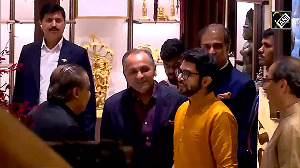Accountability is not part of the Congress culture; every failure has been dismissed as a 'collective responsibility' with every victory being laid at the doorstep of the Nehru-Gandhi clan. (One of the prime manifestations of Congress sycophancy came in 1998; even as Atal Bihari Vajpayee was preparing to take the prime minister's chair the Congress Working Committee was thanking Sonia Gandhi for her 'Herculean' campaigning!)
It will, I am fairly certain, be much the same once again later this month because, barring an outright miracle, there is no way that the Congress will increase its tally substantially. Even if it wins a few additional seats the Congress will be well short of the figure required to put up a stable ministry without begging for outside support -- and that probably means bringing the Left into the picture.
Was it this realisation that led to Rahul Gandhi's declaration that the Congress would not 'compromise on its core values'? If so, the Congress 'High Command' -- and you cannot get higher in the Congress than Rahul Gandhi -- deserves to be congratulated. He is, I believe, taking a refreshingly long-term view.
Let me explain. When a senior politician speaks of refusing to compromise it is code language for saying his party would prefer the Opposition benches. But what possible benefit would either Rahul Gandhi or his party derive from doing so?
Nineteen-and-a-half years ago, in 1989, the late Rajiv Gandhi faced much the same options. While the Congress had lost power it was still the single largest party by far in the Lok Sabha. The party had 197 MPs, well ahead of the (then undivided) Janata Dal which had 143.
Rajiv Gandhi's unequivocal refusal to attempt ministry formation left the ball in V P Singh's court. He was then forced to create a government that depended on both the Bharatiya Janata Party (85 MPs) and the Communist Party of India-Marxist (33 MPs), with various smaller parties making up the numbers. Their mutual antipathy ensured that neither the BJP nor the Left Front was in the Union Cabinet. It was a rickety arrangement, and V P Singh lost power less than a year after taking office.
What might happen if Sonia Gandhi and Rahul Gandhi decide to follow Rajiv Gandhi's example? This would paint the Left Front, the rest of the Third Front, and the undecided -- let us call them the 'Fourth Front' -- into a corner.
They could either offer unconditional support to the Congress. Or they could sit back and watch a BJP prime minister take office once again, for however brief a time. And make no mistake about it, everything suggests that a fractured mandate will lead to a general election very soon, perhaps even later this year or in the early part of next year.
Rahul Gandhi has made no secret about his ambitions for reviving the Congress in all those states where it once reigned supreme. That list obviously includes Uttar Pradesh, Bihar, and West Bengal.
The Congress leadership wants to go back and tell the voters that it was the ragtag alliance of the Left Front, the Bahujan Samaj Party, the All India Anna Dravida Munnetra Kazhagam, and so forth that caused instability. Or perhaps even gave India a BJP prime minister because that is the supreme insult to a secularist!
Flipping the coin, does the Congress have anything to gain from attempting another alliance with the Left Front and its allies? The Congress leadership has the example of the years from 2004 to 2008 before it, years when the CPI-M exercised its veto to strangle all attempts at economic reform and when it lost no attempt to humiliate poor Dr Manmohan Singh. Wouldn't it be better for the Congress to sit back and enjoy the potential discomfiture of the Left Front, the BSP, and so forth?
Rahul Gandhi, who is yet to celebrate his 39th birthday, is incredibly young by Indian political standards. He can afford to take the long view, eschewing immediate gratification for long-term benefits. And while some in the Congress may feel that time is running out for them, a lifetime of kowtowing to the Nehru-Gandhis means the Congress will go along with what its 'First Family' decides.
As I said above, it will take a miracle for either the BJP or the Congress to win enough seats to ensure a stable government. I am afraid that this means a brief return to short-lived ministries we saw in the Lok Sabhas elected in 1989 and in 1996.
The middle of a global recession, the worst crisis since the Great Depression, is a horrible time to return to the revolving door ministries India endured in 1989 to 1991 and 1996 to 1998. But we have only ourselves to blame if we give neither the Congress nor the BJP sufficient numbers to form a ministry.
The Congress at any rate is ready with a plan to refuse power if it lacks the numbers. What happens if the BJP too 'refuses to compromise on principles;? We must then get ready for another election sooner rather than later.
Hope for the best, runs the adage, but prepare for the worst. The only two truly national parties are doing just that; we voters should follow suit.





